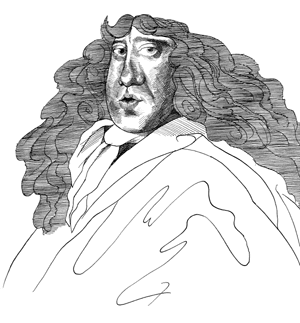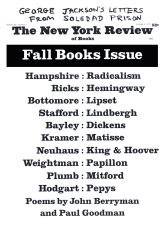Blessed be God, at the end of the last year I was in very good health, without any sense of my old pain but upon taking cold.
I lived in Axe-yard, having my wife and servant Jane, and no more in family than us three.
My wife, after the absence of her terms for seven weeks, gave me hopes of her being with child, but on the last day of the year she hath them again. The condition of the State was thus….
So Pepys began his Diary in January, 1660. The third sentence, which is the first of many references to his wife’s dysmenorrhea, does not appear in any of the editions, although it is quoted from the manuscript in Arthur Bryant’s excellent biography (Vol. I, The Man in the Making, 1933, 1947). The text has always been badly cut until now, and not just for reasons of indelicacy or bawdiness—in fact a surprising amount of mild erotica got through in the nineteenth-century editions, which partly accounts for the book’s popularity—but simply to shorten it. Of course Pepys is long-winded and sometimes boring, but no one who likes him would care to lose one sentence; and now we have the whole text for the first time.
The earlier editions, again, were not always accurate in their transcriptions of Pepys’s shorthand; but William Matthews is the leading expert in this subject and there are hundreds of new and reliable readings. The Introduction and commentary also show a vast improvement over earlier editions: Robert Latham is a professional historian, and the contributing editors look after the subjects of theater, music, works of art, and London topography. These volumes include less than a third of the Diary; the Plague and the Great Fire are still to come, and there will be a companion volume at the end of the series, which promises to be a mine of information about the Restoration period.
The Diary is the record of the most delightful euphoria of any man in literature. This euphoria was produced by steadily rising wealth and power, and showed itself in growing sexual energy and enjoyment of all that life had to offer. The sexual effects of power have often been noted in public figures: fear of the libel laws prevents me from mentioning recent names, but examples in America and Britain will readily come to mind. Pepys’s power came from his good luck in getting a job in the Navy Office, and from his hard work and skill as an administrator. He wrote in a later year “that, for myself, chance without merit brought me in; and that diligence only keeps me so, and will, living as I do among so many lazy people, that the diligent man becomes necessary, that they cannot do anything without him.”
The money came from wheeling and dealing. The military-industrial simplex then consisted of contractors trying to sell the King’s Navy timber, rope, canvas, oakum, and the like, and of officials, like those old rogues, Sir W. Batten and Sir W. Penn, who were ready to accept money, silver plate, barrels of oysters, and sides of beef. Among this gang Pepys stood out, not only because he was efficient, but also because he was honestly bent. He took only moderate bribes and from the best contractors, and saw to it that the King got good value for his money.
He knew that the secret was to avoid greed and to keep a careful memory of all his transactions. That is one of the reasons why he kept his records in cipher-shorthand, which could not easily be decoded by casual eyes. Of course, he knew that he would be investigated by Parliament, and in due course he had to face a committee, over some rather rash fiddling of prize money; but his sense of rectitude was unshaken, his confidence absolute, and he got away with it.
The euphoria of success appears in almost every entry. The only thing that could cast him down for a moment was ill health, of which he had his share. “My old pain,” in the first sentence of the Diary, refers to his stone, not a kidney stone as the editors say, but a bladder calculus the size of a tennis ball; to get rid of this, he underwent the one kind of major surgery that then offered any hope of survival. But physical suffering apart, he managed to enjoy nearly every day. Even in the middle of the plague, when the bell was tolling all day long, he would be “very merry” over dinner: the Fire and the Dutch guns on the Medway made him panic for only a moment. There was always wine, there were tiny actresses like Mrs. Knipp, there were the sights of London.
Advertisement
But euphoria on that level would not be very interesting to pursue through one and a quarter million words. Indeed, if you dip at random in the Diary you may conclude that Pepys was a jovial philistine, a fascinating semi-bore who put everything down from the price of laundry to banal comments on Shakespeare (The Tempest “has no great wit, but yet good, above ordinary plays”). It does not take one long to discover that he was in fact a man of great taste and intelligence. Taste appears in his exquisite book bindings (preserved in Magdalene College, Cambridge), in his interest in architecture, painting, and interior decoration, but above all in his passion for music. After hearing the wind music for The Virgin Martyr he wrote:
…it is so sweet that it ravished me, and indeed, in a word, did wrap up my soul so that it made me really sick, just as I have formerly been when in love with my wife; that neither then nor all the evening going home and at home I was able to think of anything but remained all night transported, so as I could not believe that ever any music hath that real command over the soul of a man as this did upon me; and makes me resolve to practise wind music and to make my wife do the same.
The first part is almost as good a description of the effect of music as Milton’s “sober certainty of waking bliss”; typically Pepys ends with a practical resolution.
His intelligence shows itself in his acute grasp of administration and of party politics, and in his wide reading, in several languages. I can’t agree with the editors that by 1660 he had acquired “the elements of the best general culture of his day: a classical and mathematical education….” Classical, yes; but years later, when he was in charge of important accounts, he writes that he has to set about learning the multiplication table; this makes me doubt that he could ever have understood much of Newton. He joined the Royal Society as a dilettante, full of curiosity about all kinds of useful and useless knowledge; but he could grasp the technology of ships, and eventually the outlines of the proto-science of his age. He moved among the cleverest men of a really clever age—Evelyn, Wren, Charles himself—and was accepted as a man of wit and understanding.
Why, then, if he was so bright, did he record so many trivialities and near idiocies in the Diary? His motives for writing are well analyzed by William Matthews, who thinks that the chief one was an accountant’s: “the diary is a concomitant of Pepys’ delight in book-keeping”; he was an excessively tidy man, and the careful entries brought some order and pattern into a disordered life. Any man who goes in for politics and casual sex, instead of staying at home with his wife and minding his business, exposes himself to the random chances of life: the more he takes conscious decisions, the more he is acted upon by unforeseen forces. To write about himself caught up in the flux of existence, as if he were a character in a play, was to take out insurance against the unknown.
In addition, there was the motive of puritanism, as Matthews suggests. Much of the diary consists of self-scrutiny and of making pious resolutions about wine, women, and the playhouse, resolutions which he always broke. This complex of motives can be seen later in Boswell, who had more literary skill but less rich psychological and social material to work on: Boswell was simply a smaller man. Just as Boswell in his London Journal saw himself as Captain MacHeath, so in Pepys the erotic comedy is related to Restoration drama. There is not much of it yet in these three volumes, and we know the pursuit of Deb Willett only from the bowdlerized editions and from odd quotations in Bryant. In some of the scenes, Pepys did not trust the security of his shorthand, and broke into polyglot jargon: “and after supper to have my head combed by Deb, which occasioned the greatest sorrow to me that I ever knew in this world; for my wife, coming up suddenly, did find me embracing the girl, con my hand sub su coat…. I was at a wonderful loss upon it and the girl also.” Or of another encounter: “she would not suffer that je should poner my mano above ses jupes which je endeavoured.” O Calcutta, quel cul t’as!
Political reality is the ultimate reality in history and Pepys was very close to it. He had an excellent network of gossip which extended through the City and Westminster, right up to persons close to the King; he had lived through a revolution, as a moderate sympathizer, and kept an open mind on everything. Consequently his well-informed comments are very helpful to historians, as Robert Latham remarks. The first volume has a splendid account of the events leading up to the Restoration, especially the swing of opinion in the City, the Army, and Parliament. He describes the apocalyptic Fifth Monarchy men cutting loose in armed rebellion, in the hope of setting up Christ’s kingdom on earth; and he analyzes the shifting fortunes of the Noncomformists, Anglicans, and Roman Catholics, showing a deep understanding of the political force of religion.
Advertisement
The most vivid writing is his narrative of his voyage to Holland, with his patron Lord Sandwich, to fetch back the new king; on board ship he took down a first-hand account of Charles’s adventures during his escape from the Cromwellians, and presents it brilliantly. But in the middle of the world’s debate, there is the man himself, missing nothing and enjoying everything; he deserves the tribute he paid himself on the third of November, 1661: “Did try to make a Song in the prayse of a Liberall genius (as I take my own to be) to all studies and pleasures.”
This Issue
October 8, 1970




